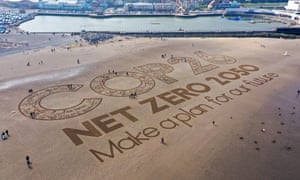It’s the phrase that will be on every world leader’s lips at the Cop26 summit – and it summarises the ambitious plan that will be central to efforts to limit the ravages of the climate crisis. So what is net zero? What kind of world could it create? And what needs to happen to to make it a reality?
As the days count down to the Cop26 summit, the phrase ‘net zero’ is coming up increasingly often. Scientists, activists, environmentalists and politicians use it as shorthand for the necessary steps to stop adding to the total amount of carbon in the atmosphere. The UK set out its net zero strategy last week, and called it a “global green industrial revolution”, even as others said it fell short of what is needed. Many see an international adoption of a target to get to net zero by 2050 – and hitting interim milestones on the way to that final goal – as crucial to our hopes of limiting global temperature rises, and hence the most devastating impacts of climate change.
And yet as recently as 2015, the agreement set out after the Cop summit in Paris made no reference to net zero. So how did a consensus emerge that net zero by 2050 was the most effective way of bringing global heating under control? What will it take to bring it about, and are existing plans set out by the UK and others enough to do it? What would a world where we have achieved net zero look like? And just how important are the Glasgow talks in bringing it about?
In today’s episode, Nosheen Iqbal talks to the Guardian’s environment correspondent, Fiona Harvey, about the origins of net zero, the science behind it, and the politics of trying to make it happen. Harvey sets out some of the necessary steps to get there, and the impediments that are still in place. And she reflects on the consequences of failure- and the reasons to stay hopeful, even if the Glasgow summit falls short.
You can follow the Guardian’s latest Cop26 coverage here, and read a summary of the UK’s new net zero strategy here.

The Guardian is editorially independent.
And we want to keep our journalism open and accessible to all.
But we increasingly need our readers to fund our work.

